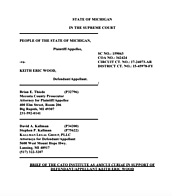Learn more about Cato’s Amicus Briefs Program.
On November 24, 2015, Keith Wood stood on a public sidewalk in front of a courthouse in Big Rapids, Michigan, and distributed pamphlets published by the Fully Informed Jury Association (“FIJA”). These pamphlets discussed the history of the jury trial as an ancient and sacred safeguard of liberty, and the jury’s crucial role as the voice of the conscience of the community. It reminded jurors that they have the authority to refuse to issue a guilty verdict if doing so would be manifestly unjust, even if legal guilt was proven.
In other woods, Mr. Wood was engaged in speech at the very core of the First Amendment’s aegis: classic political advocacy (peacefully distributing pamphlets) in the quintessential public forum (the sidewalk in front of a courthouse) on a matter of public concern more ancient than Magna Carta (the rights, duties, and independence of citizen jurors). But Mr. Wood’s advocacy nevertheless led to his arrest and conviction for violating a Michigan “jury tampering” statute that makes it a crime for anyone to “willfully attempt[] to influence the decision of a juror in any case by argument or persuasion, other than as part of the proceedings in open court in the trial of the case.” Incredibly, neither the trial court nor the first-level appellate court thought there were any free-speech concerns with Mr. Wood’s conviction. The Michigan Court of Appeals did recognize that this statute effected a content-based restriction on Mr. Wood’s speech, but it nevertheless held that application of the statute to Mr. Wood satisfied strict scrutiny.
The Cato Institute has therefore filed a brief with the Michigan Supreme Court, urging it to reverse Mr. Wood’s conviction. Under binding Supreme Court precedent, “[g]overnment regulation of speech is content based if a law applies to particular speech because of the topic discussed or the idea or message expressed.” Reed v. Town of Gilbert, 135 S. Ct. 2218, 2227 (2015). That is exactly the case here; the statute specifically targets “argument or persuasion” on a specific subject matter – jury decision-making. The statute is therefore subject to strict scrutiny, which it cannot possibly satisfy. Although states certainly have a compelling interest in protecting the integrity of jury decision-making, this statute sweeps far beyond this legitimate purpose and implicates massive volumes of speech entitled to the highest degree of First Amendment protection. Moreover, the state has no interest – compelling or otherwise – in preventing Mr. Wood from discussing the history of jury independence, including the jury’s right to engage in so-called “jury nullification.”
Mr. Wood’s conviction is all the more troubling because the jury trial itself is dwindling to the point of a practical nullity – 97% of federal criminal convictions today are obtaining through plea bargaining, not trials. We have, in effect, traded the transparency, accountability, and legitimacy that arises from public jury trials for the simplicity and efficiency of a prosecutor-driven conviction machine. There is no panacea for the jury’s diminishing role in our criminal justice system, but the least that states can do is not exacerbate the situation by singling out for punishment protected speech meant to inform jurors of their rights, obligations, and historical role as the conscience of the community.

This work is licensed under a Creative Commons Attribution-NonCommercial-ShareAlike 4.0 International License.


